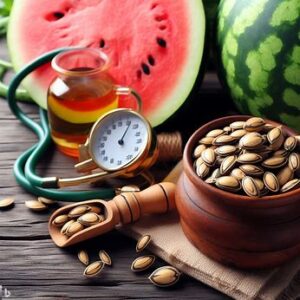
High blood pressure, also known as hypertension, is a growing concern globally due to its association with various health complications. While there are pharmaceutical treatments available, many individuals seek natural alternatives to manage their blood pressure levels. In recent years, watermelon seeds have gained attention for their potential to help reduce blood pressure. In this article, we will explore the science behind watermelon seeds and how they may serve as a natural remedy for high blood pressure.
Understanding High Blood Pressure:
Before delving into the specific benefits of watermelon seeds, it’s essential to understand how high blood pressure develops. Blood pressure refers to the force exerted by the blood against the blood vessel walls. Elevated blood pressure can strain the heart and arteries, increasing the risk of cardiovascular diseases, stroke, and other health problems.
The Power of Watermelon Seeds:
Watermelon seeds are often discarded without realizing their potential health benefits. These tiny seeds are packed with essential nutrients, including magnesium, potassium, and amino acids. It is believed that these nutrients work synergistically to help regulate blood pressure levels.
1. Magnesium: Watermelon seeds are a rich source of magnesium, a mineral known for its role in maintaining normal blood pressure. Magnesium helps relax and widen blood vessels, promoting better blood flow and reducing hypertension.
2. Potassium: Another vital mineral found in watermelon seeds is potassium. Potassium plays a key role in balancing electrolytes, regulating fluid levels, and promoting heart health. Increasing potassium intake can help counteract the negative effects of sodium on blood pressure.
3. Amino Acids: Watermelon seeds contain various amino acids, including arginine. Arginine can help produce nitric oxide, a compound that relaxes blood vessels, improving blood flow and potentially lowering blood pressure.
Incorporating Watermelon Seeds into Your Routine:
Now that we understand the potential benefits of watermelon seeds for high blood pressure, let’s explore different ways to incorporate them into our daily routine:
1. Roasted Snack: Roasting watermelon seeds can be a delightful and healthy snack option. Lightly roast the seeds with a dash of salt until they turn golden brown. Enjoy them as a nutrient-packed alternative to processed snacks.
2. Sprinkle on Salads or Yogurt: Add a crunch to your salads or yogurt by sprinkling roasted watermelon seeds on top. This not only enhances the flavor profile but also adds a nutritional boost.
3. Blend into Smoothies: Grind watermelon seeds into a fine powder and add them to your favorite smoothies. This is an excellent way to reap the benefits of the seeds without altering the taste significantly.
Conclusion:
While watermelon seeds may not provide a comprehensive solution for managing high blood pressure, they offer a natural and nutrient-rich approach that can complement a healthy lifestyle. Remember, it is crucial to consult with a healthcare professional before making any significant changes to your diet or treatment plan. By incorporating watermelon seeds strategically into your routine, you may harness nature’s power and potentially contribute to better blood pressure management.